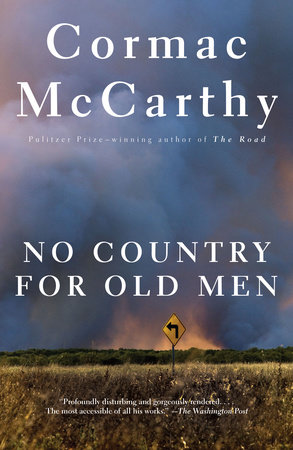Disclaimer: should you make any purchases through links in this blog, I may earn a commission from the sellers, but this does not effect the cost to you as consumer, nor does it influence the content of this blog.
When I read No Country For Old Men by Cormac McCarthy, it felt like a book that should have been written a long time ago, a book that was a part of the world long before I ever came into it. A classic. It is so well written that I could only assume that the author belonged to another time and place, a time and place that I couldn't possibly be fortunate enough to inhabit. But, this book was published in 2007, and I share this planet, and this time, with its author, Cormac McCarthy.
The blurb description reads: Llewelyn Moss, hunting antelope near the Rio Grande, stumbles upon a transaction gone horribly wrong. Finding bullet-ridden bodies, several kilos of heroin, and a caseload of cash, he faces a choice - leave the scene as he found it, or cut the money and run. Choosing the latter, he knows, will change everything. And so begins a terrific chain of events, in which each participant seems determined to answer the question that one asks another: how does a man decide in what order to abandon his life?
Before I really get going with this post, I would like to give a special mention to Team Asthers whose Etsy shop is full to the brim with bookish treats and gifts. If you like bookish things, and of course you do, you should check them out. I'll wait . . .
Okay. Here we go . . .
Cormac McCarthy's novel contains within its pages a few central themes, including morality and ethics; fate, chance, and freewill; justice and the law; and how times change. This final theme is directly and explicitly referenced in the title of this novel.
Sheriff Bell, one of the book's protagonists, ponders very much upon how the times have changed as we follow him throughout the story, and how he fears that things have worsened. And, as he turns these things over in his mind, and in conversations, he does sometimes make a pretty good case for these fears being based in more than just an older mans romanticising of the past.
As Kirsty Wark is quoted as writing, for Observer Books of the Year, 'It is an intensely intimate story. It is also a warning.'
Sheriff Bell is a veteran of World War II, Llewellyn Moss, of the Vietnam war. And, when Moss stumbles across the drug money, deciding to take it for himself (His whole life was sitting there in front of him. Day after day from dawn till dark until he was dead. All of it cooked down into forty pounds of paper in a satchel.), Sheriff Bell ends up having to try and track Moss down. In part because Moss has Anton Chigurh on his tail.
Chigurh represents everything of which the Sheriff is afraid the world is becoming. He kills without feeling, without concern, and without fear. As one character in the novel puts it to Llewelyn, "Even if you gave him the money he'd still kill you. There's no one alive on this planet that's ever had even a cross word with him. They're all dead".
But, it isn't simply that Chigurh is an unfeeling killer, it is the way he moves throughout the story, seemingly untouched by events, visiting death on everyone he meets. He acts like fate, indeed makes reference himself a number of times to how he sees fate at work in his life, has put him where he is, and to do the things he does.
Chigurh is one of literatures most chilling characters. As I say, a representation of all that the Sheriff, so concerned with ethics and justice, fears for the way of the world.
This story is sparked by a moment of chance, when Llewelyn comes across the deal gone wrong, and from there we follow as these characters impact upon one another. How each of them makes decisions which impact upon the others, bringing, more often than not, violence and death to each other. Indeed, fate and freewill, moments of chance and the decisions made in those moments are a central theme of this story.
It is quite fitting, in my opinion, that the Coen brothers made the film adaptation (mentioned in another blog post here) because I did think the story, with it's everyday characters, and violent death, a tad Fargo-esque. Not wholly so. This book is more original than that. But, it seems a fair reference point to mention when trying to explain it to anyone who might not have read it yet. And, if you've seen the film adaptation, but not read the book, the film is pretty faithful to the book. So, if you enjoyed one, I expect you will enjoy the other. I did.
If you're intrigued, you can purchase No Country For Old Men here, from bookshop.org, who support independent UK bookshops.
I do hope you found this piece enjoyable and/or useful. If you did, perhaps you would consider following/supporting me on ko-fi. Ko-fi is a platform for all sorts of creatives, and it is a great way to follow/support and stay in touch with those whose work you enjoy.
Stay safe, and see you soon!

No comments:
Post a Comment